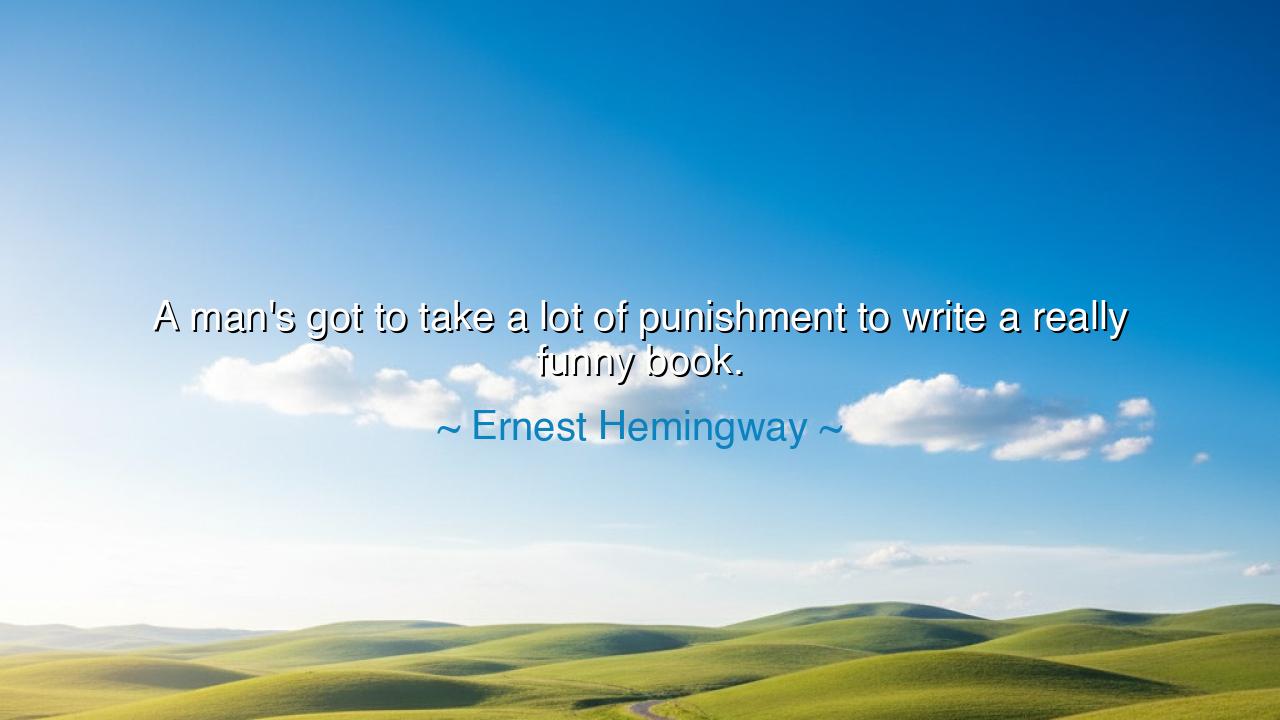
A man's got to take a lot of punishment to write a really funny






“A man’s got to take a lot of punishment to write a really funny book.” – Ernest Hemingway
In the quiet forge of the soul, where pain and wisdom are tempered into art, Ernest Hemingway spoke these words like a blacksmith striking iron: “A man’s got to take a lot of punishment to write a really funny book.” It is a truth born of fire — that humor, the kind that pierces hearts and endures through generations, does not spring from light hearts alone. It rises from those who have walked through the storm and lived to laugh about it. Hemingway, who wrestled with life’s harshest cruelties and wrote from the depths of experience, knew that laughter and suffering are twin siblings, born of the same human longing to endure.
To write something truly funny, one must first understand tragedy. For laughter without understanding is shallow, but laughter born of pain is redemptive. It is the alchemy of the wounded spirit — the transformation of sorrow into gold. Hemingway, soldier and wanderer, hunter and wounded soul, had seen death close enough to taste its breath. He knew that the man who can still laugh after all he has lost, who can turn his pain into stories that make others smile, is a man who has conquered despair itself. His “punishment” was not only physical but emotional: the scars of war, of love, of loneliness. From such wounds come words that make others laugh not because life is easy, but because it is bearable.
Consider Mark Twain, that grand master of American humor. Behind his wit burned the quiet sorrow of loss — the death of his wife, his children, his fortune. Yet from the ashes of his heart he drew forth laughter that shaped the spirit of a nation. When he wrote of foolish men, of absurd dreams and human vanity, it was not mockery but understanding. He saw through life’s illusions, yet loved it still. His humor was a light cast through the darkness, proof that even those punished by fate can find beauty in its cruelty. Like Hemingway, Twain’s laughter was not shallow joy — it was defiance, the brave smile of one who refuses to surrender.
The ancients would have called this kind of humor divine. For to laugh amidst suffering is to rise above it, to see through the veil of tragedy and glimpse the eternal. The Stoics taught that all things in life are trials sent by fate to test the strength of one’s soul. To endure punishment with grace — and even find amusement within it — is to master the art of living. Thus, the writer, like the philosopher, becomes a vessel of truth: one who distills his anguish into wisdom and laughter, so that others may drink and be strengthened.
In this way, the funny book becomes a sacred act. It is not mere entertainment but healing — a bridge between despair and hope. The author who has suffered deeply writes not to escape his wounds but to transform them. His laughter is honest, his jokes are carved from the same stone as his scars. When the reader laughs, they do not laugh at the pain, but through it. This is the greatest gift the writer can give: to remind the weary that even in agony, life still contains joy.
But this lesson belongs not only to writers. Every man and woman who walks through hardship faces the same choice: to break or to build. To retreat into bitterness, or to find humor in the struggle. The one who can smile in the midst of trials has already won half the battle. For humor, when born of suffering, does not erase pain — it redeems it. It gives meaning to endurance and courage to the broken heart.
So, take this wisdom, descendants of the living fire: when the world strikes you, do not curse it. Endure, observe, and one day, laugh. For every blow you survive, every sorrow you overcome, becomes the soil from which laughter grows. If you would write — or live — something truly funny, then live fully, suffer bravely, and never lose your sense of wonder. For as Hemingway knew, only those who have known great pain can create great joy. Laughter, then, is not the absence of sorrow — it is the triumph over it.






AAdministratorAdministrator
Welcome, honored guests. Please leave a comment, we will respond soon